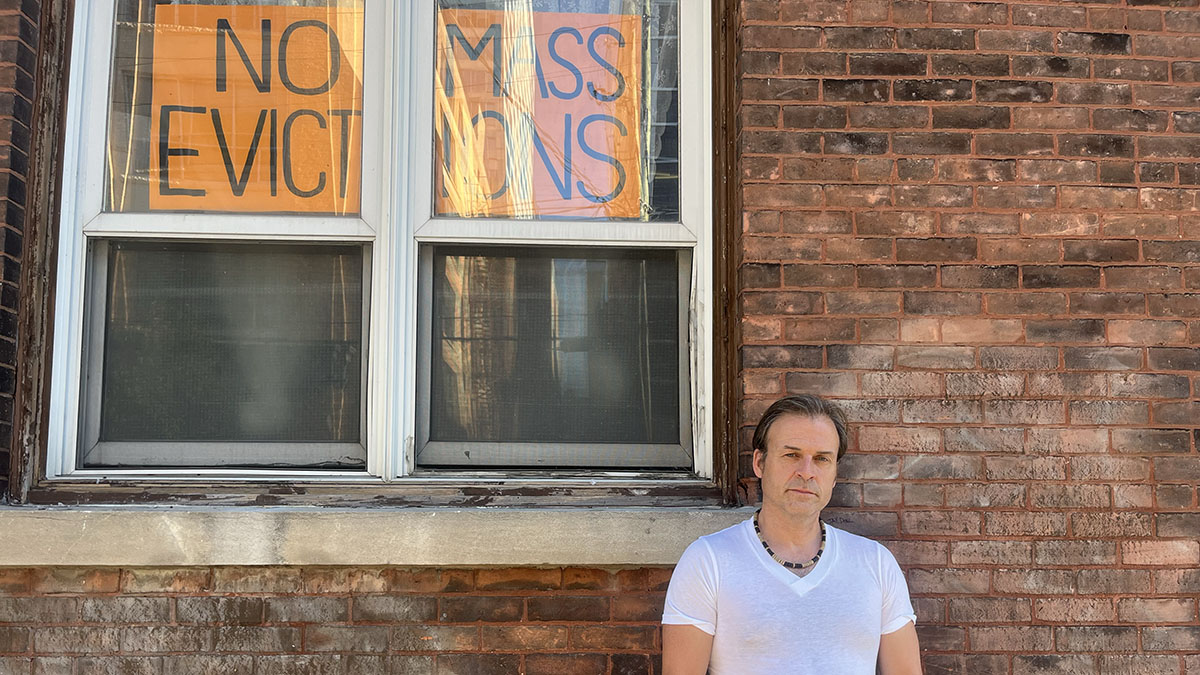Time is running out for tenants living near the intersection of Bank and Lisgar Streets, who face a February 2025 deadline to leave their homes.
Properties at 219 Bank St., 223 Bank St. and 178 Nepean St. will be demolished and replaced by a midrise apartment block.
The renters have been protesting since they received their N13 notice two years ago.
“We have zero rights, nothing for a ‘demoviction,’” said Ben Emond, referring to the displacement of tenants when the building is going to be demolished.
“The only thing they have to give us is three months of our current rent.”
Emond said he pays $750 for his two-bedroom unit.
“So, $750 times three, which is $2,200-ish, it puts me on edge,” he said.
According to data from Zumper, the average one-bedroom apartment in Ottawa rents for $2,100 a month or nearly three times the cost of Emond’s current apartment. According to the city, the new property will have 297 residential units and 886 square metres of retail space on the ground floor.
But there are no plans for affordable units in the new build, something Emond says he doesn’t understand.
“Build the … units, just make 10 of them affordable, and then they can maybe slightly raise the rent of the others or find other sources of revenue to make up for their lack of profit.”
According to the City of Ottawa, there are about 22,500 low-income units across the city, with a five-year waitlist for social housing. Ottawa provides multiple social housing options, including Below Market Rent Program, which changes the unit rent to 80 per cent of the average market price.
Kitchissippi Ward Coun. Jeff Leiper, who chairs the city’s planning committee, says the zoning proposal for the new apartment building will be approved.
“Our official plan says that’s how our traditional main streets should evolve in order to allow more people to live close to transit, close to amenities,” Leiper said.
The city is under pressure to build more housing. Ottawa has committed to providing developers with the opportunity to build roughly 15,000 new homes per year by 2031.
But when it comes to tenants’ rights, the municipal government has no say over what happens. Ottawa City Council approves zoning but the province controls landlord and tenant relationships.
“So, there’s a real gap between renter protection and our plans for intensification, and I don’t know how to square that circle,” Leiper explained.
Ethan Mitchell, a member of the Bank Block Tenants organization, says he has seen an increase in tenants struggling to stay in their homes for the past few years.
“It seems like whichever building we’re supporting, there’s either a mass eviction going on, there’s the threat of a mass eviction … or there’s an above-guideline rent increase or serious neglect or maintenance issues by the landlord,” Mitchell said.
“Almost every building has one of those things going on. And that’s been really striking because each of those is a way that landlords can either raise the rent or seriously reduce their costs,”
Statistics Canada reports that three per cent of renters experienced an eviction in prior 12 months in data collected between April and December of 2023. The number of renters evicted is equivalent to about one per cent of the population.
Some cities in the province are taking action.
A new bylaw in Hamilton, which takes effect on Jan. 1, is intended to provide additional protections for tenants affected by demovictions in that city. Under the new rule, a landlord will be required to obtain a renovation licence from the city for any demolition or renovation. The move is part of Hamilton’s Apartment Rental Program which “aims to address unfair evictions, tenant displacement and property standards within the City of Hamilton.”
In May 2024, Ottawa City Council voted to develop an anti-renoviction bylaw of its own.
Leiper said that council can step in to stop “spurious renovictions” but cannot require landlords to provide housing to tenants at the same price they previously were paying. Nor do they require landlords to support tenants during construction. A new bylaw might address some of these issues.
Mitchell said that it is more important to care about tenants’ rights at the moment, than it is to care about building more density. While “no fault” evictions are on the rise, tenants are vulnerable.
“The power of the developers run so deep in the city that … the best way to make sure demands are met is to kind of match the landlords and the developers’ power with our own tenant power, to make it sort of unfeasible and impossible for these projects to go ahead,” he said.
Capital Current attempted to contact members of the project development team but did not receive a response.




